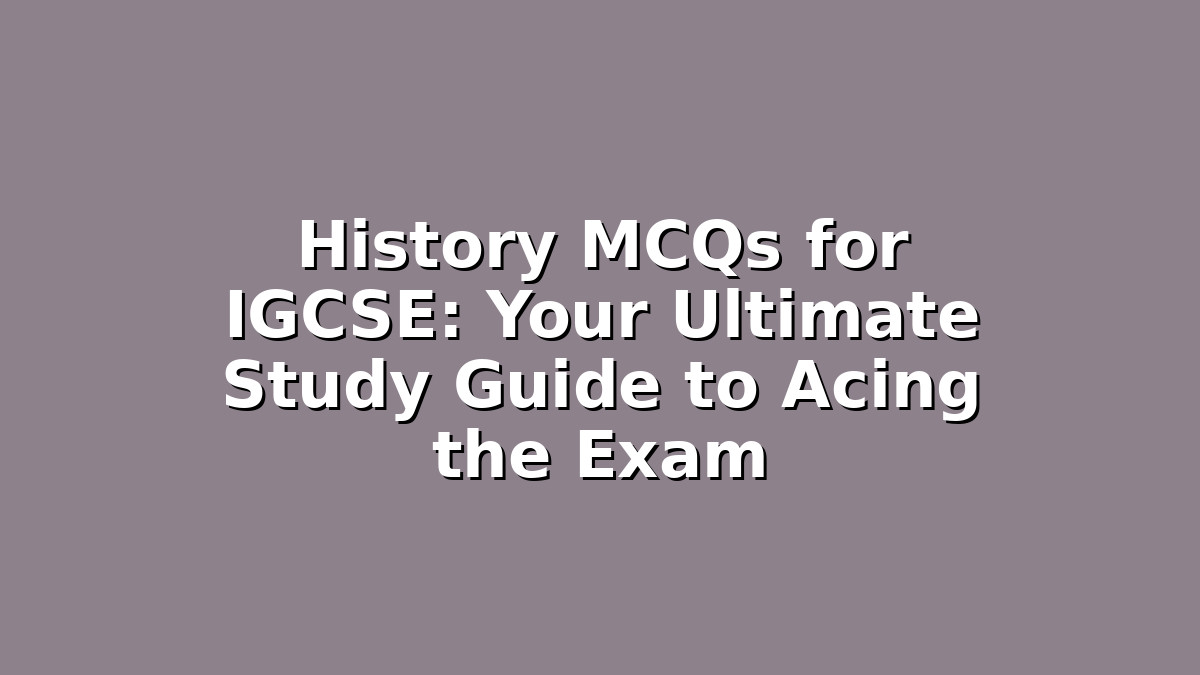Preparing for the IGCSE History exam can feel overwhelming, especially with the vast amount of content and the variety of question types you might encounter. One of the most common and effective ways to test your knowledge is through Multiple Choice Questions (MCQs). These questions not only help you revise key facts but also improve your exam technique and time management. In this comprehensive guide, we’ll explore how you can use History MCQs to boost your confidence and maximize your performance in the IGCSE exam.
Why Use History MCQs for IGCSE?
Before diving into study techniques, it’s important to understand why MCQs are a valuable revision tool for IGCSE History students. MCQs test a wide range of content in a relatively short time, allowing you to identify knowledge gaps quickly. They also help you become familiar with the exam format, which can reduce anxiety on the actual test day.
Moreover, well-designed MCQs encourage critical thinking as many questions focus not just on recall but on understanding cause and effect, chronology, and interpretations of historical events. Practicing MCQs regularly helps solidify your grasp of important topics and improves your ability to select the best answer under pressure.
—
1. How to Effectively Use History MCQs in Your Revision
To get the most out of MCQs, it’s essential to incorporate them into a structured revision plan rather than using them haphazardly. Start your revision by reviewing your notes and textbooks to build a strong foundation of knowledge. Once you have a good understanding of the syllabus topics—such as the causes of World War I, the Cold War, or the Renaissance—you can begin practicing MCQs related to these themes.
When practicing, don’t just focus on getting the right answer; take time to understand why the other options are incorrect. Many MCQs are designed with distractors that test common misconceptions, so analyzing each option deepens your understanding. For instance, if a question asks about the significance of the Treaty of Versailles, and you choose an incorrect answer, revisit the treaty’s key terms and consequences to clarify your understanding.
Use online platforms, revision apps, or past exam papers to access a variety of MCQs. Aim to practice questions from different topics and difficulty levels. This variety not only keeps your revision interesting but also prepares you to tackle any question type.
—
2. Tips for Improving Your MCQ Exam Technique
Answering MCQs effectively is as much about technique as it is about knowledge. Here are some practical tips to help you improve your MCQ skills:
– Read the question carefully: Pay close attention to keywords like “most likely,” “primary reason,” or “not.” These words change the meaning and help you focus on what the question asks.
– Eliminate obviously wrong answers: Narrow down your choices by crossing out options that you know are incorrect. This increases your chances of selecting the correct answer even if you are unsure.
– Watch out for absolutes: Words like “always,” “never,” or “only” often indicate a wrong answer in history MCQs because historical events usually have exceptions.
– Manage your time: MCQs are generally quick to answer, but rushing can lead to careless mistakes. Practice under timed conditions to improve speed and accuracy.
– Make educated guesses: If you’re unsure, use logic and what you know to make an educated guess rather than leaving the question blank.
By honing these skills, you’ll find that MCQs become less daunting and more manageable during your IGCSE History exam.
—
3. Integrating MCQs with Other Study Methods for Best Results
While MCQs are an excellent revision tool, combining them with other methods will give you a more rounded preparation. Here’s how to integrate MCQs effectively:
– Flashcards: Use flashcards to memorize key dates, people, and events. After reviewing, test yourself with MCQs covering the same material.
– Mind Maps: Create mind maps for complex topics like causes of wars or political movements. Use MCQs to test your retention of the connections you’ve made.
– Essay Practice: History exams often include essay questions. Use MCQs to ensure you know the factual content, then practice writing essays to develop your analytical and writing skills.
– Group Study: Discuss MCQs with classmates. Explaining your reasoning for answers can deepen your understanding and expose you to different perspectives.
– Past Papers: Combine MCQ practice with full past papers. This helps you apply your MCQ knowledge in a broader exam context and improve your stamina for longer exams.
This blended approach ensures you not only remember historical facts but also understand them in context and can communicate your knowledge effectively.
—
Conclusion
Preparing for your IGCSE History exam doesn’t have to be stressful. Using History MCQs as part of your study routine is a smart way to reinforce your knowledge, develop exam skills, and build confidence. Remember to practice regularly, analyze your mistakes, and combine MCQs with other revision methods for the best results. Stay consistent, stay curious, and believe in your ability to succeed. With the right preparation, you’ll be well on your way to acing your IGCSE History exam!
Good luck with your studies!

Responses